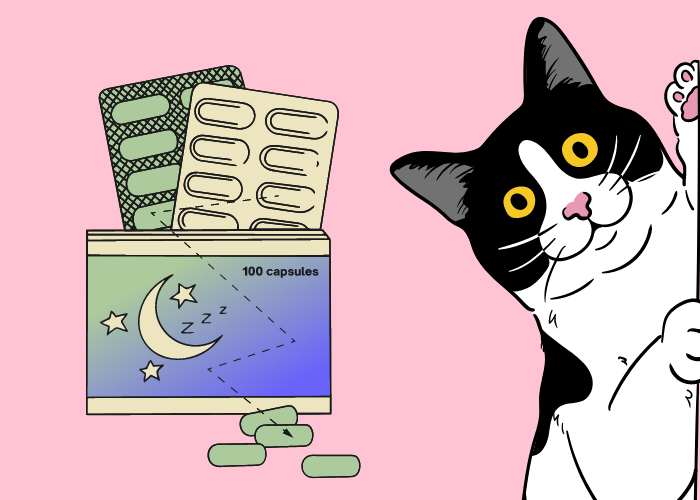Introduction
Melatonin is a hormone that is naturally produced by the body’s pineal gland in response to darkness. It plays a crucial role in regulating the sleep-wake cycle and can also have an impact on other bodily functions, such as mood and appetite. Melatonin supplements are commonly used by humans to help with sleep disorders, jet lag, and other conditions. However, when it comes to giving melatonin to cats, some pet owners may be concerned about potential harm to their cats. This is because cats have a different metabolism than humans and may not be able to process melatonin in the same way. In addition, giving a cat too much melatonin can lead to toxicity, which can be dangerous or even fatal.

Melatonin for cats
Cats can take melatonin, but it should only be given under the guidance of a veterinarian. Melatonin is not approved by the FDA for use in animals, so it is considered off-label use. However, some veterinarians may recommend melatonin for cats in certain situations.
One reason a cat may take melatonin is to help with anxiety or stress. Melatonin has been shown to have a calming effect on some animals and may help cats who suffer from separation anxiety or fear of loud noises like thunderstorms or fireworks. It may also be used to help with sleep disorders or to regulate the sleep-wake cycle.
The recommended dosage for cats varies depending on the reason for use and the individual cat’s needs. Generally, the dosage for cats is much lower than the dosage for humans. It is important to always follow the dosage instructions given by a veterinarian and to never exceed the recommended amount. Giving a cat too much melatonin can lead to toxicity, which can cause symptoms such as vomiting, diarrhea, lethargy, and even seizures. In severe cases, it can be fatal.
Can Melatonin Kill a Cat
Can melatonin kill a cat? While melatonin can be safe for cats when given in appropriate doses, there are potential risks that pet owners should be aware of.
Explanation of Potential Risks:
One potential risk of giving melatonin to cats is the risk of overdose or toxicity. Cats have a different metabolism than humans and may not be able to process melatonin in the same way. Giving too much melatonin can cause an overdose, which can be dangerous or even fatal. Other potential risks include interactions with other medications and side effects such as lethargy or digestive issues.
Studies on Melatonin and Cats:
While there have been some studies on the use of melatonin in cats, more research is needed to fully understand its effects. One study found that melatonin can help reduce anxiety in cats, but more research is needed to determine its safety and efficacy for other uses.
Signs of Overdose or Toxicity in Cats:
If a cat has been given too much melatonin, it may show signs of overdose or toxicity. These can include vomiting, diarrhea, lethargy, disorientation, tremors, seizures, and even coma. If you suspect your cat has ingested too much melatonin, seek veterinary care immediately.
- Why Does My Dog Chatter Her Teeth Around My Cats?
- Why Does My Dog Bark at Cat Litter Box Sometimes?
- Why Does My Cat Pee on Towels? [Guide]
- Does Tap Water Cause Tear Stains in Dogs? [An In-Depth Look]
Conclusion
In summary, melatonin is a hormone that can be used to help with anxiety, sleep disorders, and other conditions in cats. However, pet owners should be aware of the potential risks associated with giving melatonin to cats, including the risk of overdose or toxicity. It is important to always follow the dosage instructions given by a veterinarian and to watch for any signs of adverse reactions.
So, can melatonin kill a cat? While it is unlikely when given in appropriate doses, an overdose or toxicity can be dangerous or even fatal. Therefore, it is crucial to always consult with a veterinarian before giving melatonin to your cat and to be vigilant in watching for any signs of adverse reactions. By taking these precautions, pet owners can safely use melatonin to help their cats with certain conditions.

Doctor of Veterinary Medicine (D.V.M.) at Nation Taiwan University,Master of Science (M.S.) in Biomedical Engineering at National Taiwan University of Science and Technology




